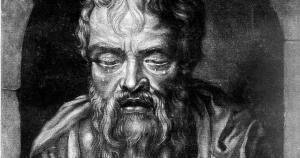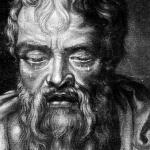250 Those who speak with sense must rely on what is common to all, as a city must rely on its law, and with much greater reliance. For all the laws of men are nourished by one law, the divine law; for it has as much power as it wishes and is sufficient for all and is still left over.*
 So said Heraclitus of Ephesus, one of the first philosophers in the Mediterranean world. He turned from the anti-intellectual polytheism of popular religion toward monotheism. He rejected both a world without a God and a world controlled by gods.
So said Heraclitus of Ephesus, one of the first philosophers in the Mediterranean world. He turned from the anti-intellectual polytheism of popular religion toward monotheism. He rejected both a world without a God and a world controlled by gods.
For Heraclitus, there was hope in a divine law, the Logos God, who could give order and meaning to all.
The monotheist turn made philosophy and science possible. This was the move of most of the Presocratic philosophers and of Socrates himself, probably Plato, and certainly Aristotle. When combined with the insights of the great monotheistic faiths (Islam, Judaism, and Christianity), much that was impossible intellectually became possible. This is uncomfortable for street materialism, so in those circles one often gets a “history” of philosophy that relies on misunderstanding two concepts: god and God.
A god is a super-being. A god can exist with no God and could exist if materialism is true. A god is like a superhero. Against all gods, there is God: omnipotent, omniscient, and omnipresent. If God does exist, there can (logically) be only one. You cannot have two all powerful beings. . . Think of the fight!
The problem of Homeric and Hesiod’s polytheism is that it found chaos at the bottom of the world. There was no real cosmos (a word for an ordered group). Instead, we had an order imposed on fundamental disorder by the gods and other minds. This order could never last and so a deep understanding was impossible.
Tell this to bright young minds and science, the study of the natural world, appears hopeless. The motivation vanishes as what seems true today will not be or might not be true tomorrow. Post-modernity is (often) merely ancient thought without the nobility of Homer. Polytheism has at least the power of cultural fecundity: the worship of super beings, gods, has produced cultures of all kinds. Atheism has been and is culturally sterile. There are no great world cultures that have been born in atheism (some horrid ones were) or been sustained by atheism.
As Plato pointed out in Laws, atheism and polytheism are alike in the inability to sustain order and liberty. The atheist might try to push meaning or order into nature or natural laws, but those laws are only experienced by the human mind. The human mind, the subjective experience, is also part of the world and so cannot be ultimately trusted. We cannot even be sure of our understanding of each other or of minds in the past.**
Against this stood the liberating idea of monotheism: there was Mind that made the cosmos. Monotheist religion stands, then and now, against superstition and chaos. Monotheism is (minimally!) the love of wisdom, of Mind.
Heraclitus was right to be skeptical about the human laws of any given city or time. The laws must always look toward the Law, the order that the Founders called the Laws of Nature and of Nature’s God. Note the continuity from Heraclitus to the framing of the American Constitution! The history of ideas is not the history of secularization, but of moving from polytheism and atheism to monotheism. The overwhelmingly obvious monotheistic consensus often will be challenged by a revival in polytheism or atheism due to regional excesses of monotheism.
Yet Heraclitus has a better solution to the evils of this time: turn to the higher law, the divine law. It is sufficient to demand life, liberty and the human flourishing.
———————————-
*Kirk, Raven, Schofield The Presocratic Philosophers
**Obviously individual polytheists and atheists can operate in historically monotheistic cultures as full and active members of those cultures. They often are better people than monotheists! Indeed, the fact that monotheism can create (and did develop) scientific and rational cultures does not mean that it will. Most often it has not. No idea is so good that people cannot mess it up, badly.












